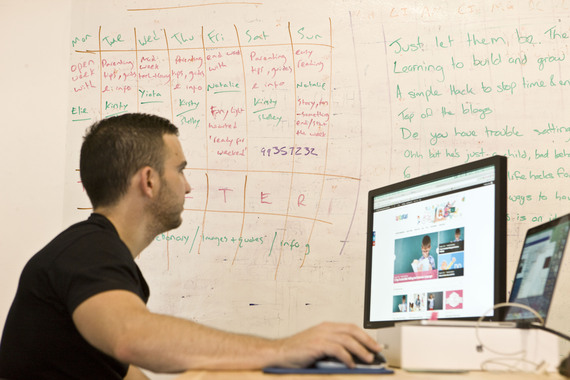Initial excitement to setup your startup is often succeeded by an emptiness of the unknown. I'm ready, now what?
Over the last few weeks I had the pleasure to speak and mentor at a series of Startup Academy events in Cyprus. The purpose was to provide useful information in the hope of inspiring people to turn up and pitch their concepts on finals day.
Easier said than done in theory but the response was massive. Twenty teams showed up and pitched the shizz out of their ideas. That was very cool.
In the end, we had a bundle of teams with good potential, including the three winners, whose next questions were all pretty much the same: "I'm ready to get started, so now what do I do?"
That got me thinking. Whether people are coming out of university, work or various competitions, everyone seems to have that same question.
Here's my answer in 10 little pieces:
1. Tell the voice of reason in your mind to shut up and back off.
I'm serious. There are usually three or four great reasons to start your own business and about one hundred not to. Silence reason, be brave or stupid, and take the plunge.
2. Understand that this is a lifestyle change, not a professional one.
You can't compare starting a startup to a current or future job. My job currently pays me X, how long will my startup take to give me X?. Sure you need to survive so you should figure out how much you need for that but nothing more.
It doesn't have to make sense.
There is also a huge evaluation of relationships that happens at this stage too, more on that here.
3. Reaffirm to yourself that you are passionate about the area you have chosen.
If you don't love the space you chose for your startup it will most likely fall apart one day. The reason you are doing this is what will drive and motivate you to pick yourself and the team up when you are lower than low.
4. Find your co-founder or co-founders (and check the first 3 points with them, I would check these with partners and close friends too).
You've established that you have what it takes to get into this. Now you need company. Choose wisely, these people must be awesome.
You need to analyze these people with specific thoughts in mind. Technical qualities matter, like having a complimentary skill set but even more than that, chemistry matters.
Ask yourself the question: Will these guys or girls get up and give up everything, quit jobs, clear out apartments and move country in a week just because it's best for your startup?
That's the kind of crazy you're looking for.
5. Put together a 5-minute pitch deck.
This is a great example of good deck structure. When you answer these questions confidently it means you understand your product and space well enough for now. This exercise helps you to refine your concept, analyze the market and figure out many answers to questions that you haven't yet faced.
Practice a 30 second version and a 5 minute one. Bonus example here.
6. Study.
When we began, we got clued up. Videos about how to pitch, what angels and VC's look for, how to form a team, startup marketing and so on. This gave us accelerated knowledge, and what you'll find in the 'tech world' is that because of the really open nature of the people, all of the information is right there for you to grab online.
7. Designate a workspace.
Whether it's your apartment or the local coffee shop, even if it's designated for a week and you'll move somewhere else after, it's important for you to feel that "this is where we go to get stuff done."
Assign it, meet up with co-founders, make a plan, work.
8. Speak to people.
Go out there and network. You're looking for co-founders, people to work with you, potential partners, future investors and mentors.
These people don't just show up. Go out there and talk, respect people who say 'no' but ask them to recommend others to you who might be interested. Usually these people want to help and will pass on a name of someone who may be relevant if they aren't interested themselves.
9. Make a commitment.
This one is important. If you're doing this, you're really doing it. You cannot afford to waste your own or other people's time by saying things like "I'll work on it whenever I can" or "Let's see how it goes."
Quit your job, stop your master's degree or less extreme: allocate and strictly stick to a time slot for this. If you have a full time job, work on your project from 7-12, if you need 2k to get started, put the money in. Either way, vest yourself into the project to a level where you feel bound, that you've made a step which becomes tough to come back from.
"The hardest step is the first one but once you leap forward, it becomes impossible to look back."
10. Forget about money.
I have heard so many excuses for not getting started but I have heard none as many times as 'there is a lack of funds available'. Funds for what?? Your idea? Everybody is capable of putting time, effort and a little cost covering expenditure down for the first six months to get the product and the team to a level where you can analyze what the next step will be.
Once you have an MVP, a few cool people around you and a good grasp of your potential or actual users, then, and maybe then, should you start thinking about external money.
-- -- -- -- -- -- --
This list has been drawn from personal experience with Funifi and also from what I consider a reasonable analysis of the situation as it stands. I've also had the privilege of discussing these issues with people far more experienced than myself and with those in similar situations.
There is nothing certain about this journey, it will be probably be exciting and frustrating, it will make you cry and laugh. You will learn to embrace uncertainty purely because there is no other way to stay sane.
Actually, only one thing is for sure in all of this: that for anything that I've mentioned to matter or make sense, you need to get started.


